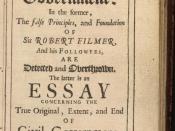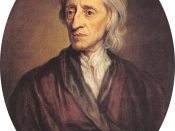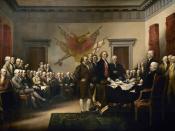Enlightenment Thinkers
The Enlightenment thinkers, also called philosophes, represented a revolution in the way mankind would think and regard religion, government, and education as well as many other things. Royalty and church authority of the time tried to suppress their ideas. They considered their ideas outrageous and as a threat to the well being of the state and their power. America's founding fathers were greatly influenced by the Enlightenment. Many of its ideas are still regarded with the utmost respect today, and many of its thinkers are household names, such as Voltaire, Locke, and Rousseau.
John Locke fought to protect individual liberty from arbitrary state authority. In his "Second Treatise On Government", he lays the groundwork that gave birth to the liberal tradition that aims to safeguard the natural rights of people from tyrannical, despotic governments. He pointed out that the power to govern derives from the people, therefore the government is supposed to implement the people's will.
To him, political power represented the power that every man gave up into the hands of society to be employed for their own good. If every individual in a group agrees to put all their power in a single governing body, it only makes sense for that body to look out for the good of all its members; not the private interests of certain individuals.
Locke believes all humans are born with three very important natural rights: life, liberty, and property. And as I already said the main purpose of government is to protect these rights. The sole reason people created government is to PROTECT the RIGHTS, and this is done through the legislative, which is given the power to make laws. In "Second Treatise On Government", Locke establishes "bounds set to the legislative":
1)one rule for rich...


